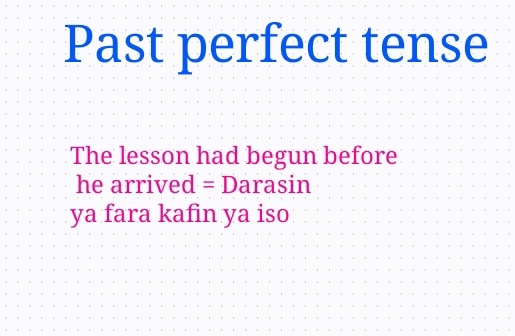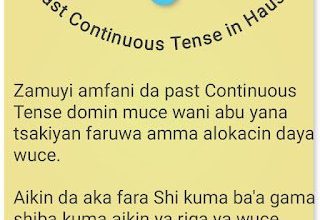Menene Past perfect tense a cikin karatun turanci?

Menene Past Perfect Tense a cikin karatun turanci?
PAST PERFECT TENSE: ana amfani da shi ne domin gabatar da aikin da bai daɗe da faruwa ba abaya kafin wani aikin ya faru.
Yadda ake haɗa PAST PERFECT TENSE:
Kamar dai yanda abin yake ana fara saka subject ne a farko idan jimlar positive ne, amma kuma idan negative ne sai a fara saka kalmar “had”.
Acikin past perfect tense ba’a yin amfani da kalmomin “has” ko “have”. Shi kalmar “had” yana iya ɗaukan singular ko plural subject
Kalmar da yake zuwa a gaban “had” shine “past participle”. Shikuma past participle sune kalmomin regular da kuma irregular verbs wato sune irin waɗannan kalmomin: Eaten, come, made, written, talked, looked, worked, da dai sauransu
Positive Statement (Magana ta tabbatarwa)
SUBJECT + HAD + PAST PARTICIPLE… .
Misali
- She had cooked the dinner before her husband came back. = Ta riga ta gama girkin daren kafin mijin ta ya dawo.
- I had lost my phone = Na ɓatar da waya ta
- After I had talked to them, they advised me. = Bayan nayi magana da su, sun bani shawara.
- They had travelled to zaria = Sunyi tafiya zuwa zaria
- Ahmad had called Abdulmaleek before his friend arrived. = Ahmad ya riga ya kira Abdulmaleek kafin abokin shi ya iso.
- She had finished the work. = Ta gama aikin.
Positive Question (Tambaya ta tabbatarwa)
HAD + SUBJECT + PAST PARTICIPLE…?
Misali
- Had she cooked the dinner before her husband came back? = Ta riga ta gama girkin daren kafin mijin ta ya dawo ne?
- Had she finished the work? = Shin ta gama aikin ne?
- Had she wearied hijab? = Shin ta sanya hijabi?
- Had Ahmad called Abdulmaleek before his friend arrived? = Ahmad ya kira Abdulmaleek ne kafin abokin shi ya iso?
- Had they understood the lesson before you left? = Sun fahimci darasin kafin ka tafi kuwa?
Negative Statement (Magana ta korewa)
SUBJECT + HAD + NOT + PAST PARTICIPLE… .
ko kuma ayi contracted na “had not” ya zama “hadn’t
SUBJECT + HADN’T + PAST PARTICIPLE… .
Misali
- She had not cooked the dinner before her husband came back. = Bata riga ta gama girkin daren ba kafin mijin ta ya dawo.
- She had not washed her face. = Bata wanke fuskar ta ba.
- I had not talked to them after they advised me. = Ban yi magana da su ba bayan sun bani shawara.
- She had not finished the work. = Bata gama aikin ba.
- Ahmad had not called Abdulmaleek before his friend arrived. = Ahmad bai riga ya kira Abdulmaleek ba kafin abokin shi ya iso.
Negative Question (Tambaya ta korewa)
HAD + SUBJECT + NOT + PAST PARTICIPLE…?
Or
HADN’T + SUBJECT + PAST PARTICIPLE…?
Misali
- Had she not cooked the dinner before her husband came back? = Bata riga ta gama girkin daren bane kafin mijin ta ya dawo?
- Had Ahmad not called Abdulmaleek before his friend arrived? = Ahmad bai riga ya kira Abdulmaleek ba kafin abokin shi ya iso?
- Hadn’t they understood the lesson before you left? = Basu fahimci darasin ba kuwa kafin ka tafi?
Karin bayani: Past perfect tense zai iya zama ayyuka guda biyu da suka wuce, aikin farko zai iya kasancewa ya wuce da nisa, daya aikin kuma aikine daya wuce kusan bai daɗe ba. Misali
- We had completed the work before he requested for it = Mun gama aikin kafin ya tambaye mu
- They had gone before I got here. = Sun riga sun tafi kafin inzo nan
A cikin jimloli guda biyu da suke sama zaku ga aikin da bai daɗe da wucewa ba shine ake sawa “had”, amma da yake ɗayen aikin ya daɗe da wucewa shiyasa yazo kawai a matsayin Simple past tense
Akanyi amfani da waɗannan kalmomin dake ƙasa wajen amfani da past perfect tense:
- After
- Before
- For
- Already
- Yet
- Until
- Since
- The moment that
- Just




